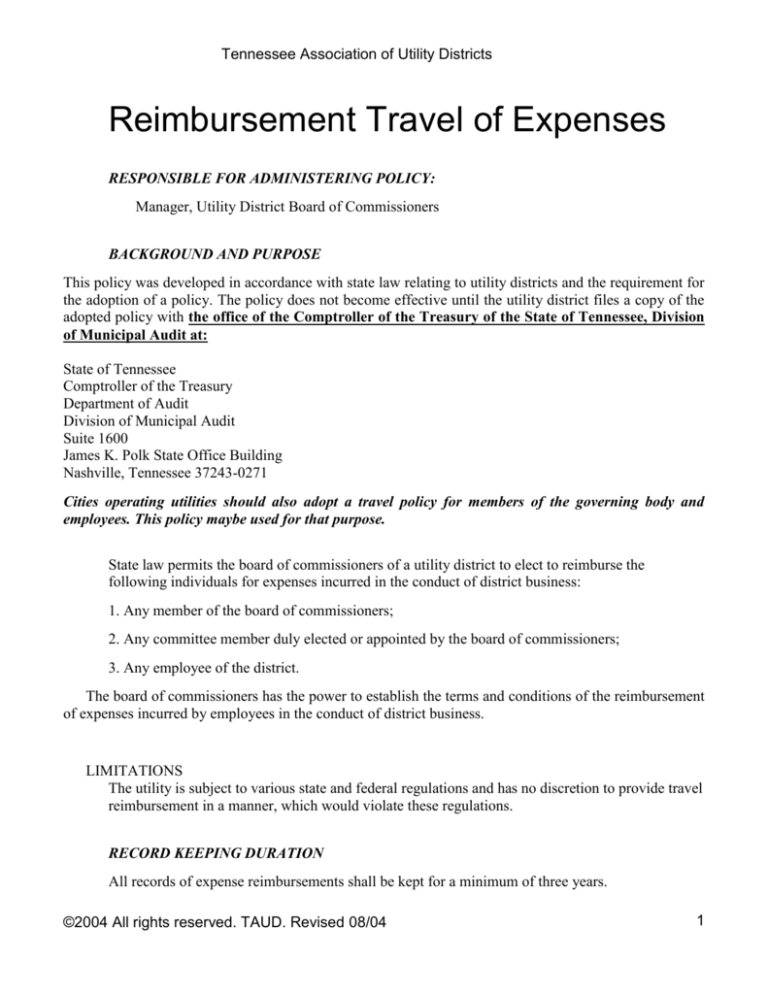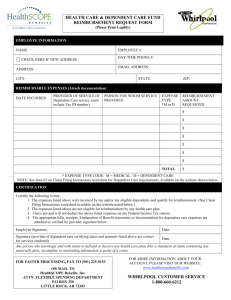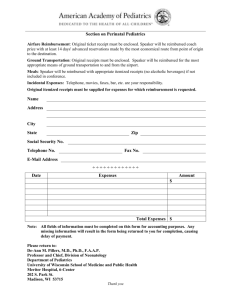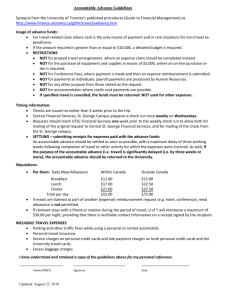
Tennessee Association of Utility Districts
Reimbursement Travel of Expenses
RESPONSIBLE FOR ADMINISTERING POLICY:
Manager, Utility District Board of Commissioners
BACKGROUND AND PURPOSE
This policy was developed in accordance with state law relating to utility districts and the requirement for
the adoption of a policy. The policy does not become effective until the utility district files a copy of the
adopted policy with the office of the Comptroller of the Treasury of the State of Tennessee, Division
of Municipal Audit at:
State of Tennessee
Comptroller of the Treasury
Department of Audit
Division of Municipal Audit
Suite 1600
James K. Polk State Office Building
Nashville, Tennessee 37243-0271
Cities operating utilities should also adopt a travel policy for members of the governing body and
employees. This policy maybe used for that purpose.
State law permits the board of commissioners of a utility district to elect to reimburse the
following individuals for expenses incurred in the conduct of district business:
1. Any member of the board of commissioners;
2. Any committee member duly elected or appointed by the board of commissioners;
3. Any employee of the district.
The board of commissioners has the power to establish the terms and conditions of the reimbursement
of expenses incurred by employees in the conduct of district business.
LIMITATIONS
The utility is subject to various state and federal regulations and has no discretion to provide travel
reimbursement in a manner, which would violate these regulations.
RECORD KEEPING DURATION
All records of expense reimbursements shall be kept for a minimum of three years.
©2004 All rights reserved. TAUD. Revised 08/04
1
POLICY STATEMENT
1 ... The board of commissioners has elected to reimburse expenses incurred by the
Who is covered following individuals for the purpose of conducting district business:
a) Members of the board of commissioners;
b) Committee members elected or appointed by the board;
c) District employees.
Eligible
expenses
2 ... Expenses incurred by a spouse, children, other relatives, friends or
companions are not eligible for reimbursement.
3 ... Expenses eligible for reimbursement must be actual, ordinary and necessary in
the conduct of district business. These include expenses for the following:
a) Transportation;
b) Lodging;
c) Meals;
d) Registration for conferences, conventions and seminars;
e) tolls, taxicab fees and parking fees;
f) Other actual, ordinary and necessary expenses deemed to be connected to the
conduct of district business by the board of commissioners.
4 ... All mileage shall be computed based on Official State of Tennessee or RandTransportation McNally maps or actual mileage.
5 ... District Vehicles. The board of commissioners or manager may require that an
employee drive a district vehicle to conduct district business.
6 ... Personal Vehicles. When a personal vehicle is used, the following
limitations apply:
a) Mileage shall be reimbursed at a rate no higher than established in IRS, which is
currently ____ cents per mile.
b) Mileage shall be reimbursed only for the most efficient route (considering distance
and time), plus reasonable vicinity mileage.
c) If the trip is extended for personal use, personal mileage must be deducted.
d) If two or more employees or officials travel together in one person’s vehicle, only
the person who owns or has custody of the vehicle will be reimbursed for mileage.
e) Employees and officials will maintain adequate insurance to hold harmless the
district for any liability from the use of personal vehicles.
©2004 All rights reserved. TAUD. Revised 08/04
2
Tennessee Association of Utility Districts
f) In no event shall mileage reimbursement, plus vicinity travel and associated
automobile costs, exceed the lowest reasonable available airfare and associated travel
costs.
g) Employees or officials shall not be reimbursed for automotive repair or
breakdowns when using their personal vehicles.
7 ... Airlines. The following limitations apply:
a) Employees and officials should make full use of discounts and special rates for
advance airline reservations.
b) Reimbursement will be made for tourist class airfare only.
c) Mileage credits for frequent flyer programs accrue to the traveler; however, there
shall be no circuitous routing, scheduling of a particular carrier or other manipulations
of air schedules to maximize travel credits.
Lodging
8 ... Lodging rates shall not exceed the maximum rates authorized by IRS
Publication 1542, except when authorized in advance by the board of
commissioners for such occasions as conventions and conferences.
9 ... If two or more persons share a room, each traveler shall claim one half of the
double room rate and file expense forms at the same time.
10 ... If an authorized traveler shares a room with a non-district traveler, the actual
cost will be allowed up to the maximum reimbursable amount.
11 ... Laundry expenses and other personal expenses will not be reimbursed.
Meals
12 ... Meals allowance shall be based on the federal rate set in IRS Publication 1542
based on the quarter’s method (meals & incidentals) (this can be found at
http://www.gsa.gov/portal/category/100120.
13 ... No meal reimbursement shall be giving unless an overnight stay is required.
Travel
Advances
14 ... At the discretion of the board or its designee, authorized travelers may request
either a travel advance for the projected cost of authorized travel expected to exceed
$100 or advance billing directly to the district for registration fees, airfares, meals,
lodging, conferences and similar expenses.
Reimbursement 15 ... Travel advance requests are not considered documentation of travel expenses. If
travel advances exceed documented expenses, the traveler must submit the difference
Procedure
to the district at the time the expense reimbursement form is submitted.
16 ... All expenses must be documented with the expense reimbursement form and
applicable receipts. Meals accounted for in the meal section of the expense
reimbursement form do not require a receipt.
17 ... Expense forms are to be submitted for payment as soon as is practical after
completion of travel. If expenses are not submitted within 30 days, they will not be
reimbursed.
©2004 All rights reserved. TAUD. Revised 08/04
3
18 ... All claims for expenses, with the exception of meals claimed in the meals
section of the expense reimbursement form, must be supported by the original paid
receipt for all reimbursable expenses where possible. If a receipt is lost or unavailable,
the expense form should state that the receipt is lost or unavailable.
19 ... If a travel advance was used, a copy of the travel advance form must be
submitted with the expense form, along with appropriate receipts.
20 ... If a refund is due the district from a travel advance, a check should be attached
to the expense form, made payable to the district for the difference.
21 ... All expense reimbursement forms shall be examined and approved by either the
board of commissioners, manager or their designee before payment.
Optional
Extended Stay:
22 … Where conferences, meetings and/or other training sessions end prior to the
end of a normal workday and where travel back an attendee’s place of residence can
not be completed in what is considered “normal commuting time” this time is to be
defined as within ____ (suggest 1 to 2 hours) of a normal workday.
(Choose one)
a. At the discretion of the utility manager;
b. At he discretion of the attendee, due to safety concerns;
c. At the discretion of the board
An additional night’s stay is authorized. Return to the attendee’s place of residents on
the follow day should be carried out in an expeditious manner.
The decision to allow for the extended stay for both a & c should be made at the time
the travel is authorized.
ADOPTION DATE: _______________________________
EFFECTIVE DATE: _______________________________
©2004 All rights reserved. TAUD. Revised 08/04
4
Tennessee Association of Utility Districts
7-82-309. Powers of commissioners - Payment of expenses.
(B) The utility district board of commissioners shall determine whether or not to pay the expenses
incurred by members of the board, and any board or committee member elected or appointed by the
president of the board of commissioners, and any official or employee of the utility district whose salary
is set by charter or general law; and, if it is determined that the utility district will reimburse expenses, it
shall enact a written policy as to how expenses will be reimbursed and determine what expenses are
reimbursable.
(C) In such utility district, it is the duty of the board of commissioners to prescribe forms on which
expenses will be reported. The board of commissioners may designate such responsibility to the chief
administrative officer of the district. It is the duty of the board of commissioners, or its designee, to
examine such expense report to determine if all expenses so listed as reimbursable are legally
reimbursable expenditures within the schedule as determined by the utility district board of
commissioners, and, if such listed expenses are reimbursable, then forward the expense report to the
proper disbursing officer for payment.
(D) To the extent not adequately documented as provided in subdivision (a)(6)(C), expense
allowances shall be considered compensation for purposes of any salary limitations as may be provided
by statute, charter or private act.
(E) All utility district travel and expense reimbursement policies, and any amendments thereto,
shall be filed with the Office of the Comptroller of the Treasury or the Comptroller of the
Treasury's designee. Such policies and amendments are not subject to approval of but shall not be
effective until filed with the Office of the Comptroller of the Treasury.
(F) The Tennessee Association of Utility Districts (TAUD) shall disseminate, and amend from time to
time as necessary, a model travel and expense policy to provide guidance for the various utility districts.
Such policy and amendments thereto are subject to the approval of the Comptroller of the Treasury. Any
utility district that adopts the policy promulgated by the TAUD is not required to file such policy
with the office of the Comptroller of the Treasury, but shall notify the office in writing of adoption
of the model policy.
©2004 All rights reserved. TAUD. Revised 08/04
5
The following two questions were asked of Mr. Dennis Dycus of the Division of Municipal Audit.
The questions and answers are attached to this policy for your information and clarification.
Question No. 1: Would it be proper for a utility district’s board of commissioners to adopt a policy
whereby they pay the registration fee, additional hotel room costs (if any), meals, banquet tickets, and any
other normally reimbursable expenses incurred by employee’s spouse while attending a conference with
said commissioner? In such situations, the UD employee was approved to attend the conference as part of
the district’s training and education program.
Question No. 2: Is it a proper expenditure of utility funds to, assuming the properly approved expense
reimbursement policy allows for it, reimburse a commissioner for expenses incurred by his/her spouse
while accompanying them on official district business or to pay for either of their entertainment expenses
(sight seeing tours, golf tournaments, Broadway shows, alcohol, in-room movies, limousines, and so on).
The answer to both questions can be addressed at the same time. You may try to refer to specific laws,
attorney general opinions and so on. But you really need to only ask one question in determining if any of
the above items are eligible for reimbursement, regardless if such expenses were incurred by a district
commissioner or their spouse or a district employee or their spouse. The question is: Did the
expenditure of district funds serve a public purpose?
What public purpose is served by a district commissioner, employee or their respective spouses playing
golf, taking a sight seeing cruise, getting a massage at the hotel spa, paying $100 for a single meal,
ordering an in-room movie or attending a Broadway show? I would be hard pressed trying to explain
how such expenditures benefited the customers.
When adopting expense reimbursement policies, the first question to be asked as to whether a certain
expense should be reimbursed is again, did the expenditure serve a public purpose? If not, it should not
be eligible for reimbursement. If it should be determined that certain expenses, which were reimbursed to
a commissioner, served no public purpose, such funds may be considered compensation and subject for
federal taxes. That in turn could cause the total compensation paid to a commissioner to exceed the
statutory limit, which in turn creates another very nasty problem.
Before you request reimbursement for a questionable expenditure, you need to ask yourself, is it worth it?
The above is my opinion and should not be construed to be either legal advice or the official position of
the Comptroller of the Treasury. Should you wish a legal opinion, I would recommend that you seek
legal counsel.
Dennis F. Dycus
©2004 All rights reserved. TAUD. Revised 08/04
6




